The Centre will make available for public consultation its review of the income tax law within six months, revenue secretary Sanjay Malhotra said on Thursday.
An internal panel is working on the review. “We will have a consultation process and how it will happen that we will decide. We would like to have a collaborative approach for implementation,” Malhotra said at an event organised by the Federation of Indian Chambers of Commerce and Industry (Ficci).
The Act that started its journey in 1922 contains 298 sections, 23 chapters and other provisions in its current form of 1961.
Finance minister Nirmala Sitharaman in her budget on Tuesday announced a review of the Income-tax Act, 1961. "The purpose is to make the Act concise, lucid, easy to read and understand. This will reduce disputes and litigation, thereby providing tax certainty to the taxpayers. It will also bring down the demand embroiled in litigation," Sitharaman said.
Malhotra said that the efforts of the Centre would be to provide a "hassle-free, simple" and a collaborative approach towards the implementation of taxes.
"Our approach towards taxation has always been and will continue to be in the mode of collaboration and not confrontation. The purpose of our proposals, both on the policy side as well as on the implementation side, is to collect taxes from wherever they are due but do it in a manner that gives respect and trust to the taxpayers and collects them in a smooth and hassle-free manner," he said.
Gokul Chaudhri, president – tax, Deloitte South Asia, said “the finance minister articulated the government’s commitment towards a stable and simplified tax regime. The budget proposals emphasise on improving taxpayer services by leveraging technology, ensuring tax certainty and reducing litigation while broadening the tax base to garner revenue for developmental needs."
The previous UPA government had attempted a reform earlier in 2010 through the Direct Taxes Code Bill, 2010, which lapsed and could not become a law.
Meanwhile, Ravi Agarwal, chairperson, Central Board of Direct Taxes, told the industry chamber that the new tax regime with new slabs and rates is beneficial for all and around 2/3 of the total taxpayers have opted for the new regime. He also highlighted the benefits of rationalisation of taxation on capital gains, reduction in TDS rates along with litigation and appeals.
Sanjay Kumar Agarwal, chairperson, Central Board of Indirect Taxes and Customs, said the indications on the indirect taxes in the Union Budget 2024-25 is clear that one needs simplified taxation and rationalized rates to enhance supply chains and ensure our industry remains competitive globally.
Ravi Agrawal told PTI the income tax act has seen "redundancies" over a period of time making it "thick and bulky."
"The taxpayers also feel that the Act is not so simple, as it ought to be...it is cumbersome...so the attempt is if we can make this Act simpler, simpler to comprehend, simpler in terms of language, simpler in terms of presentation, then that hitch of the taxpayer to actually not see the Act and take the help of a tax practitioner or someone (maybe eased)..."










